How are gypsy weddings going?
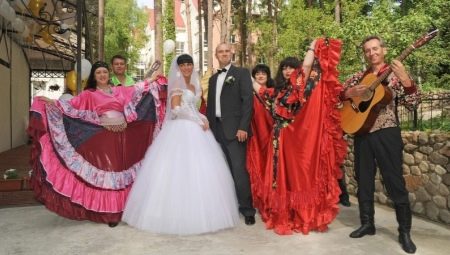
Gypsies are a cheerful people, whose life is shrouded in its own traditions and rituals. Many people are interested in how gypsy weddings are held, as this celebration attracts with its peculiarities and colorfulness. Such an event has an interesting history and rules that must be followed.
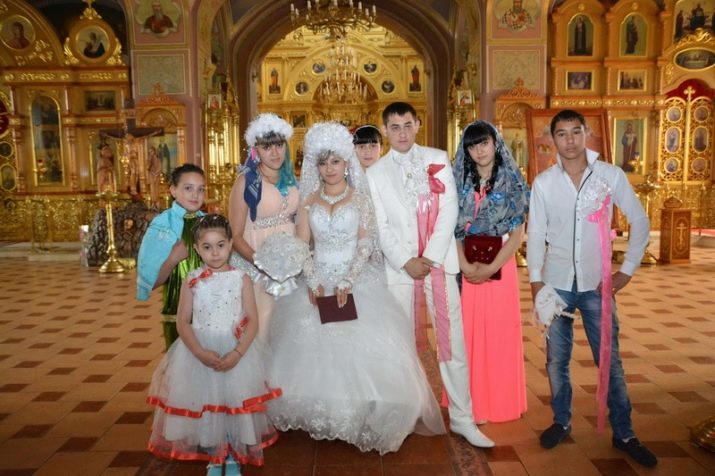

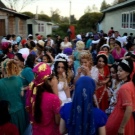

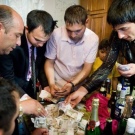
Matchmaking
Roma often woo their children when they are babies. As a rule, such a tradition is characteristic of close-knit families who want to become related. It is completely unnecessary for the bride to know that she is being wooed, since at this moment she is a child.
But also the gypsies have up to now classical patriarchal laws, according to which the daughter has no right to contradict the will of her father.
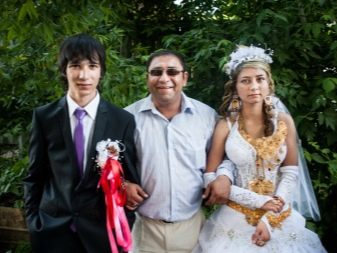

During matchmaking, relatives from the future husband's side go to the house of the future bride's family and take with them two key elements.
- A bottle of wine, decorated with expensive coins, or a twig with kerchiefs with banknotes on it.
- Wedding loaf. It is a cake covered with a handkerchief. The relatives of the future husband should bake it on their own.

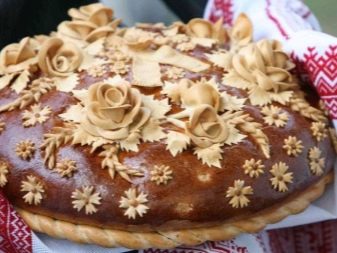
If all the attributes brought were placed on the table, this meant that the daughter's parents were not against such a union. During the event, the bridegroom takes place, the ransom amount is discussed, which is given to the girl's father and mother. The bride's family also contributes to the young family's fortune, which is a dowry. Typically, it consists of bedding, jewelry, and other items.
The guy's relatives do everything possible to make the matchmaking procedure look magnificent and certain results are achieved:
- demonstration of their own solvency;
- the bride's father and mother must agree to the marriage.
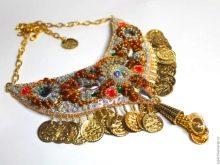
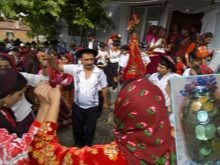
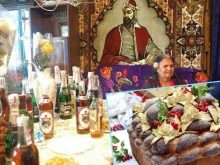
The father of a young gypsy woman never responded instantly with consent to the marriage, saying that he needed time to make such a decision, and the bride was too young. However, in most cases, such phrases already symbolized consent to the wedding. If in the end the parents agree, the girl herself is called and her desire is asked. The answer was clear in advance, since a daughter has no right to refuse her father.
The future father-in-law put a coin of gold around the girl's neck. This symbolized the prohibition of repeated matchmaking. If a girl was wooed in infancy, the son's father would still give a coin to be worn in the future.


Sometimes the matchmaking could last for several days. The duration of the event depended on the security of the future wife's side - until the parents agree to the wedding, all costs are borne by the bride's side. When consent was sounded, all expenses for the holiday had to be paid by the groom.
There were times when parents could marry a girl who was 9-10 years old. After the consent of the bride's side, the girl was taken by the groom's parents to their house, and she lived with them until the age of 13-15, after which a wedding was scheduled. Such unions were necessary in order for young Roma to grow up in the usual rhythm of the nation's life.
It is rare in modern society to get married at such an early age. Now the wedding is being played at the time when the young are 16-20 years old.


Theft and ransom of the bride
Bride ransom is a procedure that involves the transfer of funds to the bride's side as a token of gratitude for agreeing to marry her daughter. Using this method, the groom expressed his gratitude for the fact that the father-in-law and mother-in-law brought up a wonderful wife for him.
But also the ransom can be carried out by relatives from the side of the future husband. Young guests from the husband come on the very day of the celebration to the house where the bride lives, but the girl's brothers do not give their sister away without a ransom. According to custom, lengthy negotiations are held with the transfer of sweets and alcoholic beverages, after which a staging of the "storming" of the gate is played out, and the groom takes the bride out of the house.
However, there were also those guys who could not offer a large ransom. They could only steal the bride and take her away. At the moment, similar traditions also exist.
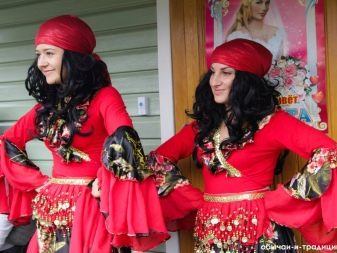
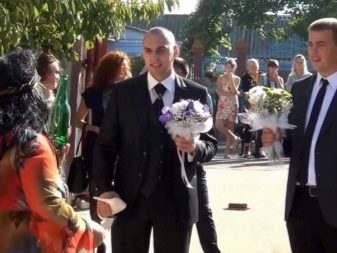
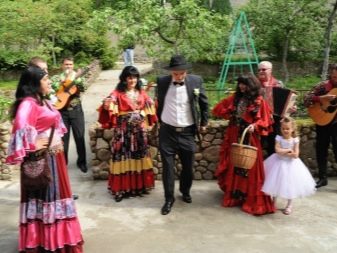
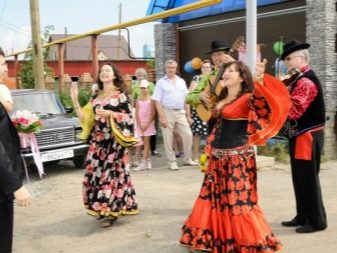
Theft by mutual consent or in a violent form, as well as non-fictitious theft, are among the customs of the Roma people, but they were not considered the prevailing form of marriage. The gypsies themselves disapprove of such actions. The result of such escapes could be different: either the bride and groom managed to escape from the camp, and after a while they were accepted back as spouses, or they caught up with the young, and their escape ended tragically.
Now the Roma have slightly changed their traditions. Parents do not communicate with their children in an orderly form, but only give advice. The prospective bride and groom can get to know each other better before entering into an alliance. However, the desire for kinship with respectable and decent families still exists.


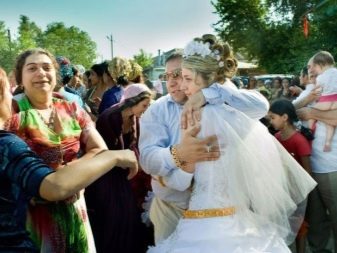
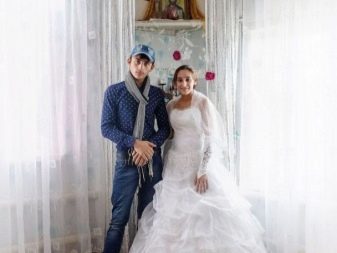
Customs and traditions
According to tradition, a gypsy wedding lasts 3 days. It is distinguished by various rituals that have ancient roots. Distinctive features of marriage among Roma are that they do not need to attend a registry office for a wedding. For the celebration, only the approval of the community is required, and divorce is not provided. Free gypsy people are used to living on the basis of their feelings, not reason.
A beautiful wedding, to which all family and friends are invited, is among the priority events.
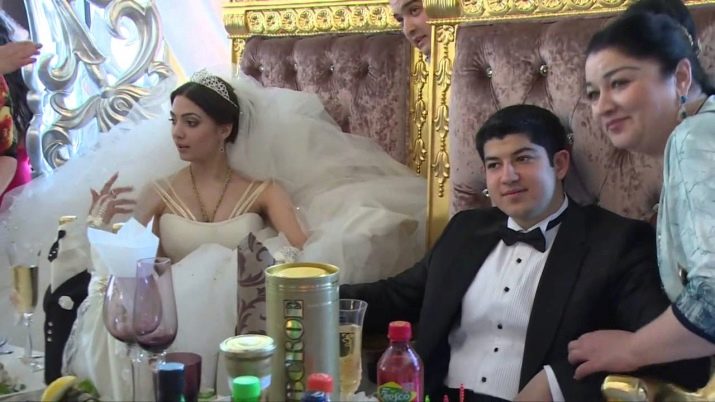
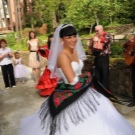



Gypsies have been among the nomadic nations since ancient times, but when settling in new areas, they can take on new traditions.For example, if a family lives next to the Slavs, they can resort to a church wedding. Until now, modern Russian-speaking gypsies are famous for their religiosity and often marry in an Orthodox church.
And also chastity must be observed before marriage, along with strong moral rules. For this reason, while the wedding is taking place, even the newly-made spouses (until the second day) are in different places so as not to touch each other. These laws are strictly observed in every Roma family and are still in force.
Roma rituals are relevant everywhere, regardless of where families live: in the city or in the villages.



Woman dressed as a bride
There is a tradition of exchanging brides. During such a custom, the girl's side gave up her daughter and took the sister of the future spouse as a bride to her son. Such an event was considered beneficial for both families, since there was no need to pay a ransom.

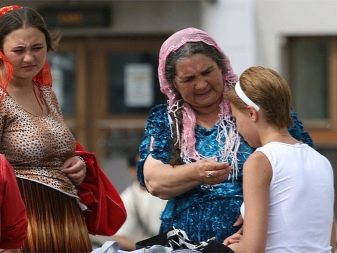
How are wedding dates chosen?
A gypsy wedding is an important event. Since the celebration lasts three days, it takes place in the summer so that guests can sing and dance in warm weather. There used to be a tradition according to which low tables were set up at the wedding venue and carpets were spread right on the ground. Guests were seated on the carpets, so it was difficult to create such an atmosphere in cold weather.
In modern times, this tradition is rarely observed, but some Roma still use it.


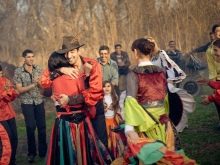
hen-party
This nation often hosts bachelorette parties, which are also one of the wedding traditions. This event falls on the shoulders of the girl's father and mother (the wedding itself is organized by the groom's party). A bachelorette party is held a day before the celebration with the presence of only young people. On this day, a young gypsy woman says goodbye to her friends.
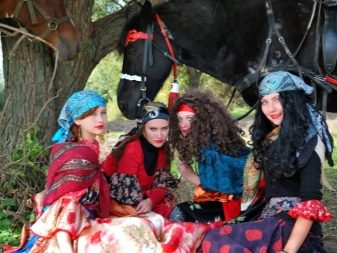
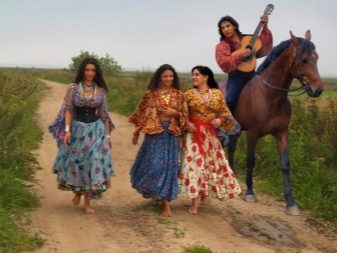
Entourage of gypsy weddings
The room or tent in which the young are accommodated should be decorated with scarlet ribbons. This shade of the gypsies symbolizes passion and should accompany everyone throughout their lives. And also a red flag must be present in the dwelling. On the date when the wedding is held, all the ceremonies begin to be performed at dawn.
In the bride's house, a small table is set for those who come to visit. Live music starts playing in the morning. The bride herself at this moment is preparing herself and is waiting for a wedding dress, located in the dwelling of the future husband. The girl herself has no right to dress up. When the dress is put on, a young gypsy woman goes to the guests and performs a dance. Then everyone goes to the wedding.
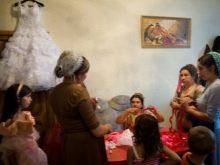


Appearance of young people and guests
Every man's clothes should have red ribbons. The groom's elegant clothes also have white and red ribbons, only wider. The weddings of the Gypsy people attract attention with their beauty and beauty, fun. The bride herself is dressed in a beautiful wedding dress.
The appearance of the guests demonstrates their status. You can immediately distinguish between unmarried gypsies from married ones: the latter dress up in national clothes, and free girls can attend a wedding in a trouser suit.

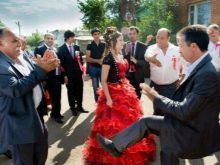

Blessing with an icon or bread
Such a tradition is present only among the Roma who have converted to Orthodoxy, but this does not affect the caste culture, which has its roots in Indian traditions. For this reason, the blessing of the young with the help of the icon can only be carried out by the upper layer of the camp. The lower layers are blessed with bread.
Wedding bread is baked by women who have found happiness in family unions. Others can only buy it.

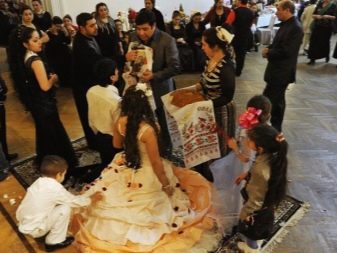
Honor of the bride
Among gypsies, it is not common among girls to have sex before marriage. At the moment when the spouses get married, after the celebration, they lock themselves in the room.The young go there together with two women, who are witnesses of the concluded union and the fact that the girl married a virgin.
A wedding is always accompanied by such a ceremony. To show that the girl was clean, a veil was spread on the marriage bed, on which the young wife lost her virginity. If there was no blood on the sheet, the family of the gypsy was subjected to severe shame.
At the moment, there are families that fiercely defend this tradition, but it is not as strong as in past times.

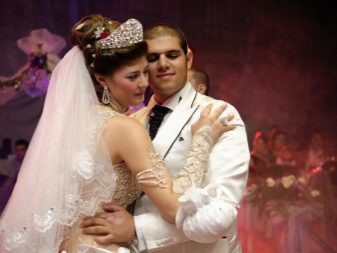
In families where a real gypsy wedding is held, all the rules must be respected, and the bride, who was not clean, leaves her husband's house in disgrace, and the marriage itself is considered dissolved. When the virgin sheet is covered, the girl is obliged to change her white dress to red. The hair should be hidden under a kerchief, which indicates that the girl is now married. After that, the feast continues.

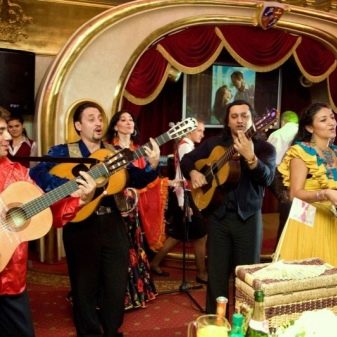
"Fraternization"
Such a procedure is carried out between young people when the veil of virginity is demonstrated. The procedure demonstrates the unity of blood, where an incision is made on the hand of the young, which they must touch. With the help of this action, the blood on the wounds is mixed. After that, the husband and wife become relatives and must share everything among themselves and raise children together.
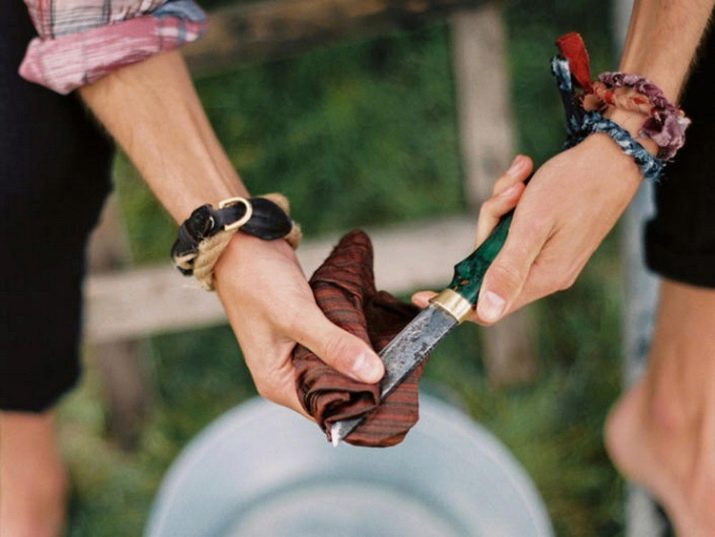
Rules of conduct for guests and newlyweds
At the wedding, the bride usually takes place, so many free girls and guys are invited to the celebration. In most cases, such events end successfully, and in the future new alliances are concluded. A wedding among gypsies is a closed ceremony, so only our own people are there, strangers rarely appear. However, there are exceptions, but disrespectful conversations about guests are not allowed.
At the table, the young should sit side by side, and the rest of the men and women are at separate tables. Treats are laid out on special copper tables with low legs, and the guests themselves, as mentioned earlier, sit on the carpets. During the celebration, parents say a parting speech to their children and wish them success in family life.


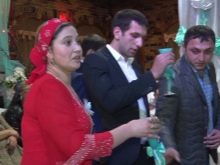
A key place in the whole celebration is given to marriage information. In the evening of the first solemn day, matchmakers or adult representatives of the camp, in whose hands there was salt and a loaf, approached the young. They spoke in a Gypsy speech: “So that you do not become disagreeable to each other, just as bread and salt do not become disgusting among yourself. Just as you are unable to tear yourself away from the bread, just as you do not tear yourself away from each other. " Young people are obliged to tear off a piece of loaf and eat it with salt.
The tradition of meeting young people with bread and salt was popular among many nations.that were related to agriculture. Gypsies were not so often engaged in agricultural work, but at the end of the 19th century, such a rite became common among the nation. When asked about the life of young people, they usually said: "like bread and salt."
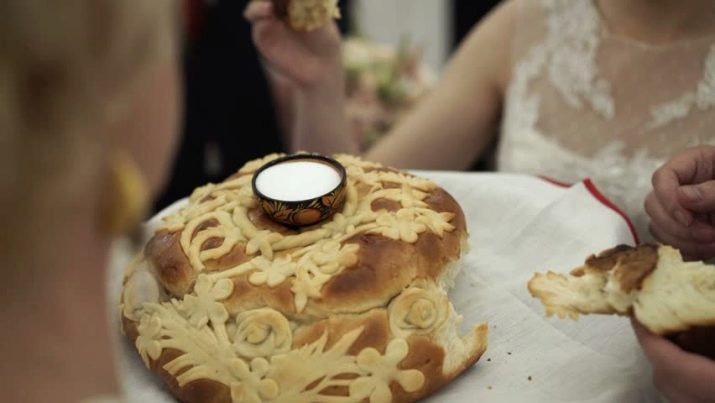
For the wedding celebration, the guests gave the newly-made spouses expensive items or finances. During the presentation the words were said: "From me a little, from God more." It so happened that gifts could recoup the costs of a holiday.
Then the couple went to the tent, which the other guests left. In some cases, elderly women were allowed to stay. This action should take place in the midst of the holiday. The culmination of the celebration is the taking out of the young man's shirt on a tray with scarlet flowers. The guests drink to the girl's parents and say gratitude to them for such a beautiful daughter. All those present receive flowers made of paper or scarlet ribbons, which were attached to outfits and hairstyles.

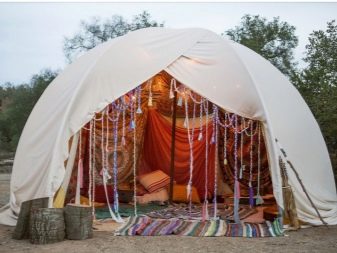
After the shirt was taken out, a scarf was put on the bride's head, an apron was placed on the skirt. From that moment on, the girl could not appear in front of other males without a headscarf. The hairstyle also suffered changes.Free gypsies could braid their braids or loose their hair, and married girls braided small braids near their foreheads and twisted loose strands upward, to the pigtails. This hairstyle is called amboldinari.
The scarf also had to be tied in a special way: the ends are twisted into a bundle and tied at the back. All changes in appearance demonstrated the transfer of the gypsy woman to a new social category.

On the third day, after the girl moves to her husband, the dowry is redeemed. This rite contains the details of the Gypsy culture, therefore the dowry is taken out on a cart, which is harnessed by a horse. The whole procedure is humorous and takes place with musical and dance accompaniment. The dowry itself is not displayed.
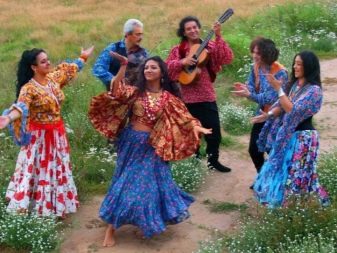
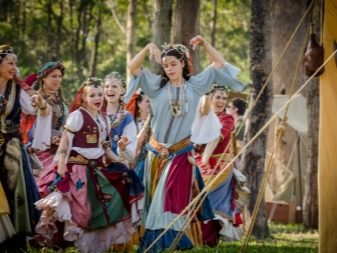
Consider the features of the behavior of guests and newlyweds.
- By tradition, you can give alcohol to a wedding. The presented present must be immediately put on the table. However, despite the large amount of alcohol, fights at a gypsy wedding are rare.
- There are numerous treats on the festive table.
- Women are forbidden to touch men, so as not to defile them.
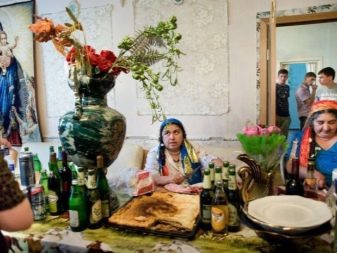

- The phrase "bitter" is prohibited.
- The bride and groom do not perform the wedding dance.
- According to tradition, young people have no right to talk to each other at a celebration. With the help of this method, the girl shows humility. She is obliged to be silent all day, and the spouse can talk with those present.
- Men and women not only sit separately at the tables, but also perform dances in their own circle. A characteristic feature of the wedding is the gypsy dance.



For more information about the wedding of gypsies in Russia, see the next video.








